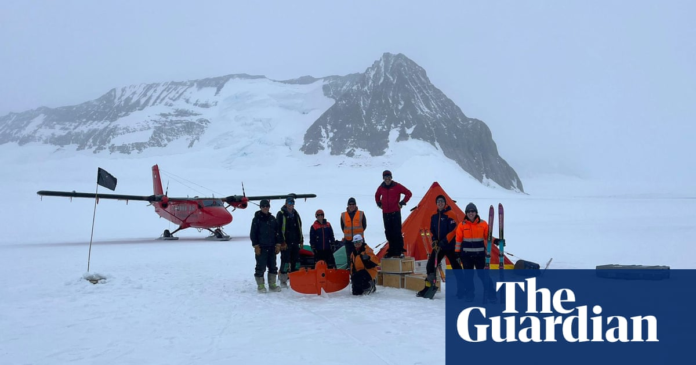Please bookmark for future updates
From the Flask glacier to King George Island, intrepid researchers expect good cheer, snow and penguins
Many of us will not get a white Christmas this year, but a group of scientists are guaranteed one while carrying out research on the Antarctic peninsula.
While ice and good cheer are expected, their yuletide activities will be very different from those back home. Dr Kate Winter, of Northumbria University, and colleagues will be deploying instruments on Flask glacier to study the way that meltwater affects how quickly glaciers flow into the ocean.
Along with two other researchers, Winter will start Christmas morning sharing an orange pyramid tent, their sleeping bags nestled on top of sheepskin rugs above wooden boards.
“We might put some extra spices in our porridge,” Winter said. The team will deck their tent in hand-crocheted wool baubles, and possibly indulge in some hot chocolate. “And then I think we’ll go and do some science in the morning. It can be a long day if we’re in a tent, thinking about those at home.”
Winter said the team planned to ski the 4 miles (6km) or so to their research site, where they will undertake various jobs such as putting up solar panels.
While skiing, the scientists will be roped together like Santa’s reindeers. “If one of us falls down a crevasse, we rely on the others to save us,” Winter said.
But it won’t all be work. Winter, who has spent Christmas in Antarctica before, has plans afoot. “I’m going to teach the others how to make Antarctic ice-cream,” she said. The process involves Angel Delight powder, condensed milk, and snow from the landscape.
What else is on the festive menu will be something of a surprise. “What [the chefs] do is they vacuum-pack food for us as well, and we can keep it frozen, obviously, in ice next to our tent,” Winter said. “We might not know what we’re getting for Christmas dinner – we can just take it out and put it in a pan of boiling water.”
Without an easy internet connection, video calls are tricky and it is hard to send photos, but the team will be hoping to text or phone families.
“I’ve got two little ones at home, so I’ll hear what they’ve got from Father Christmas,” Winter said. “I did put in a good order before I left.”
Dr Rohi Muthyala, another member of the team, from Columbia University, said before setting off that she was looking forward to the expedition.
“Antarctica is definitely more special than anywhere else you can be. So I’m definitely excited to have the entire experience. Everything seems surreal, and when it snows it just feels magical,” she said.
Dr Ben Davison, a team member from the University of Leeds, said: “We are going to be at a glacier that only a handful of people have ever been to before, doing some really important work with a fantastic team. And I think that will be a really rich experience that we’ll hopefully remember for a long time.”
Dr Rowan Whittle, a palaeobiologist at the British Antarctic Survey, will also be spending Christmas in the Antarctic – although she isn’t expecting a frosty landscape at her base on King George Island, about 75 miles off the coast of Antarctica.
Sign up to Down to Earth
The planet’s most important stories. Get all the week’s environment news – the good, the bad and the essential
after newsletter promotion
Whittle is part of a team of fossil hunters hoping to mine the distant past to glean insights into the future.
“When we went [to Antarctica] last time, we were looking at sea creatures that lived on the sea floor when Antarctica was warm and covered in forests,” she said. “This field trip we’re going to [explore] when Antarctica got first covered in ice.”
Whittle said the idea was to compare the communities on the sea floor between the two massive climate shifts, an endeavour that could shed light on the implications of a future warming climate.
Whittle expects that Christmas Day will be spent setting up camp on the island – a location that, while snowless, will be replete with penguins.
Penguins are often found frolicking on Christmas cards but some of their ancient relatives would have been rather more intimidating. “About 38m years ago you get penguin fossils, but they were giant penguins, about 6ft tall … with long, pointy beaks. So, monster penguins,” Whittle said.
While Santa may have his home in the Arctic Circle, the researchers hope he finds time to visit the south pole this year. “A fully articulated penguin fossil would be lovely,” Whittle said.
Create an account
Welcome! Register for an account
A password will be e-mailed to you.
Password recovery
Recover your password
A password will be e-mailed to you.
Thursday, December 26, 2024

